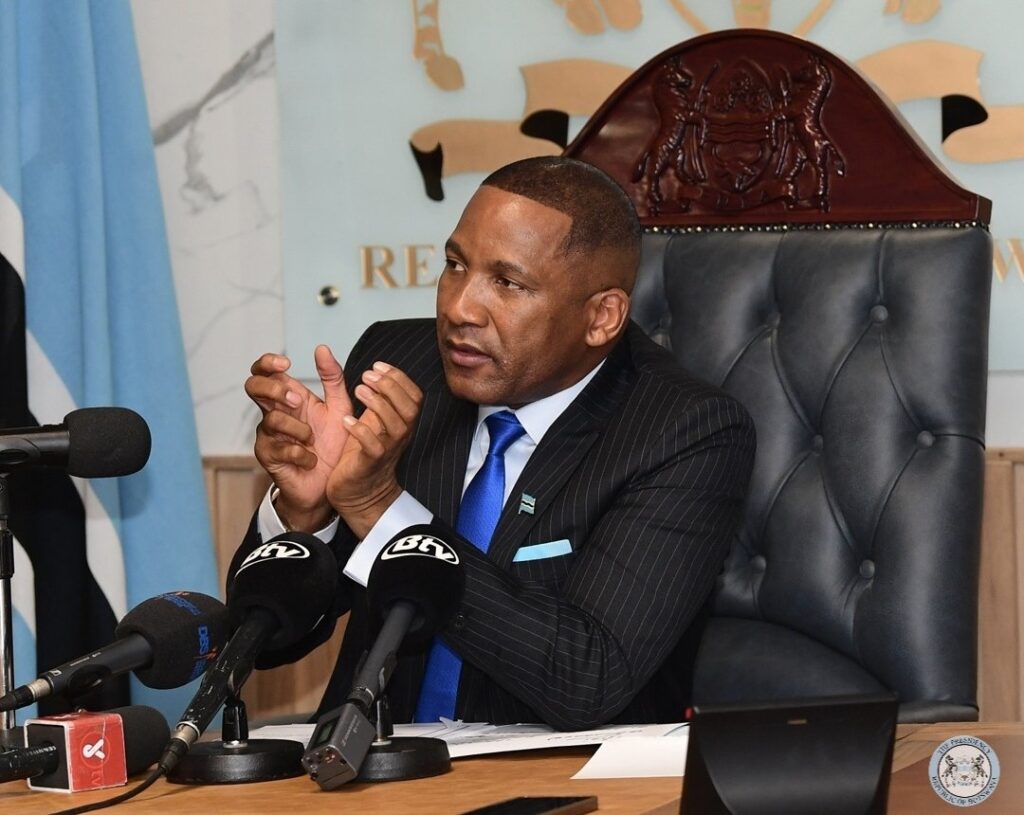The New Man who Leads Botswana

President Duma Gideon Boko is playing with a new economic playbook, looking away from diamond mines for a new mainstay. Following a historic power shift on November 1, 2024, that marked the end of a 58-year monopoly, Boko appears well qualified and prepared to chart a new course for the world’s largest producer of diamonds.
A Business Africa Report, Dec 2024
In every ramification, he stood out from the lot with his keen vision and strong passion for a greater Botswana.
However, his core message of economic diversification and sustainable growth may not be new to the tabloids, because his predecessors, Mokgweetsi Eric Keabetswe Masisi, and a couple of others before him, tried it with little results as Botswana navigates a difficult economic terrain orchestrated by dwindling revenue.
Nevertheless, Duma Gideon Boko seemed to enjoy huge local support from the populace, who are backing him to pursue this path, and he seemed undaunted by the task. His people, about 2.4 optimistic Botswanas, youthful and strong, are looking forward to a new era of economic transformation under Boko’s leadership, asking for more employment opportunities and people-policy to close the widening gap between the rich and the poor.
The Path Ahead
An avid advocate of the rule of law, well admired for his people oriented political views, Boko was quick to get to work, setting high targets for his first 100 days in office. He emphasizes the need for immediate solutions to stabilize the Botswana economy and create long-term reforms that will ensure sustainable growth.
For decades following independence from Britain, Botswana, a naturally endowed nation and the continent’s biggest producer of diamonds, had remained wholly dependent on the stones, which account for about half the country’s earnings. Hence, the decline in diamond revenues by over 60% in recent years had a huge impact on the economy. Now, even though the precious stone is beginning to gain weight in the market, the Boko-led government has maintained a strong position that it will continue to strengthen relationships and nourish the diamond sector for maximum efficiency and increased yield. However, it is also making it crystal clear that the time for putting all their eggs in one basket is over.
“We recognize that diamonds will not be the mainstay of our economy forever,” President Boko explained. “We must diversify and invest in sectors that will drive growth and create jobs for our people.”

“We recognize that diamonds will not be the mainstay of our economy forever,” President Boko explained. “We must diversify and invest in sectors that will drive growth and create jobs for our people.”
Gideon Boko
In Boko’s view, the way forward is the uncharted course that has the potential to turn fortunes around. “We are committed to creating a more inclusive and diversified economy, one that benefits all citizens, not just a select few,” he had emphasized during his state of the nation address.
“This is the Botswana I see, a nation where opportunity is abundant, where young people have the skills and jobs they need, and where our natural beauty is preserved for future generations.”
Botswana receives over 3,200 hours of sunlight annually, making it an ideal location for large solar energy projects. The country’s unique wildlife and ecosystems offer vast opportunities for eco-tourism, and its diverse minerals resource could provide ready raw materials for industries. The country’s high literacy rate, with 88.5% of the population aged 15 and over being literate, provides a solid foundation for economic growth and development.
“This is the Botswana I see, a nation where opportunity is abundant, where young people have the skills and jobs they need, and where our natural beauty is preserved for future generations.”

LET ME REMIND BATSWANA THAT WE HAVE SET OURSELVES A LOFTY GOAL OF BECOMING A HIGH INCOME COUNTRY BY THE YEAR 2036, AND WE ARE LEFT WITH ONLY 12 YEARS TO ACHIEVE THIS GOAL. WE WERE WELL AWARE OF THE COMMITMENT AND DEMANDS IT WILL TAKE TO ACHIEVE THIS GOAL, AND AS YOU ALL KNOW, CHANGE DOES NOT HAPPEN ON ITS OWN; NEITHER CAN IT JUST BE WISHED”, HE SAID.
Gideon Boko
The Duma-led government has already begun its economic reforms, with the intention of attracting investors. This will include streamlining bureaucratic processes and updating its investment ecosystem and commercial laws to align with global best practices, with a focus on attracting investors with good bargains. Government sources also hint that it will create economic incentive packages to attract investments in high potential sectors, like renewable energy, tourism, agriculture, and manufacturing.
While he tackles the challenges that may hinder the actualization of his core goals, Duma Gideon Boko, the 6th President and leader of the Botswana second republic, made it very clear to the people that he is not a magician. He can only succeed to the extent he gets their support. “Let me remind Batswana that we have set ourselves a lofty goal of becoming a high-income country by the year 2036, and we are left with only 12 years to achieve this goal. We were well aware of the commitment and demands it will take to achieve this goal, and as you all know, change does not happen on its own; neither can it just be wished”, he said.
